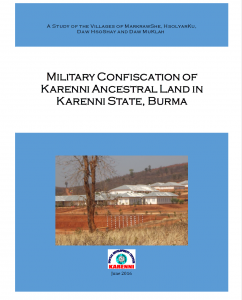Military Confiscation of Karenni Ancestral Land in Karenni State, Burma
By Karenni Social Development Center • August 11, 2016 In Karenni State, the people and their ancestors have traditionally depended on agricultural land for their livelihood. The traditional way of life of the Karenni people has been complicated by the unlawful confiscation of villagers’ ancestral lands by the Burmese military which intensified after the leaders of the different ethnic groups in Burma signed ceasefire agreements with the Burmese government between 2011 and 2013. Some of the interviewed villagers see the confiscations as a continuation of the Burmese military’s aggression in the area after the ceasefire. Decades of conflict have made the local people fear the Burmese military.
In Karenni State, the people and their ancestors have traditionally depended on agricultural land for their livelihood. The traditional way of life of the Karenni people has been complicated by the unlawful confiscation of villagers’ ancestral lands by the Burmese military which intensified after the leaders of the different ethnic groups in Burma signed ceasefire agreements with the Burmese government between 2011 and 2013. Some of the interviewed villagers see the confiscations as a continuation of the Burmese military’s aggression in the area after the ceasefire. Decades of conflict have made the local people fear the Burmese military.
While a study of the situation across the entire state is beyond the scope of this project, the research presented in this report hopes to provide a picture of a larger trend across the region. The main focus of this study is on four farming villages in Karenni State. These villages are MarkrawShe (in MarkrawShe village tract), HsolyarKu (an urban area), Daw HsoShay (in Law Pi Ta village tract), and Daw MuKlah (in Chit Kel village tract). The ancestors of the villagers in these four villages have used their lands for generations, following a traditional way of farming known as shifting cultivation agriculture. This way of life has been complicated by the unlawful confiscation of local lands by the Burmese military, claiming that land used for shifting agriculture is vacant, abandoned land. The military has referred to a 2012 enacted “land law,” which says that uncultivated land belongs to the state,2 to justify the military’s confiscation of villagers’ traditional land.
Download full report in English here.
Tags: Business and Human Rights, Karenni Social Development Center, Karenni State, Land Confiscation, Military RegimeThis post is in: Economy, Health, Human Rights, Law, Military Regime
Related PostsKaren State September 2016 Conflict: The Real Motivations Behind Renewed War
Burma Army’s actions in Karen State threaten to expand fighting, endangering peace process and displaced people’s return
Ann Din Coal Power Plant: Local Movement and Action to Preserve and Protect Natural Resources and Land: Mon IDP Report Case Study #4
New film: Shan State’s unique “Thousand Islands” under threat from Salween dam plans
EU Must Continue UN General Assembly Resolution on Burma









 All posts
All posts